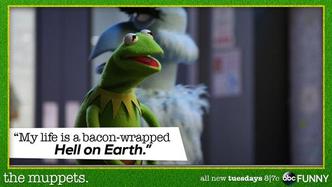
We might laugh at this example and see it as absurd, but our own mainstream culture lives in fear of certain words which it has labeled as “bad.” I was recently chided for using “the F word” by my middle school son’s principal. I then proceeded to use it again along with some other words she probably didn’t appreciate either. The absurdity of her inability to name the word that disturbed her was both annoying and amusing to me.
The bottom line is that there is no such thing as a “bad” word. Words have cultural connotations, but they are just words and letters. The word fuck, for instance, is both a noun and a verb. The adjective is fucking. These words contain the letters f, u, c, and k just like many other words in the English language such as futtock, firetruck, rackful, sackful, unfrock, truckful, and fullback. There is nothing inherently wrong with those letters or any way that they can be used to form words.
However, if you decide that you find the word “fuck” offensive, then it is you (along with many others in our society) who is labeling the word as bad, and it is you who has issues around the word which you need to process. The word itself is not actually bad. If you don’t know why you are afraid of that word, look to your childhood. Your parents, teachers or church probably taught you that the word was bad and that if you used that word, you were bad. Nothing could be further from the truth. The words we use are merely words. The intent behind the word is what matters. If you tell someone to “fuck off,” in most situations that person will be offended, and probably rightfully so since you are telling them that you don’t respect them or their opinions. However, if you ask your romantic partner, “Want to fuck?”, the response will likely be quite different. The fact that the word fuck is considered profane by many is rooted in a societal fear of sexuality that exists simultaneously in a culture where sexual references abound. It’s a strange bit of hypocrisy in our world.
When we continue to teach others that certain words are “bad,” then we are perpetuating misinformation and conditioning our next generations in the same way we were conditioned as children. My own kids all know every “profane” word in the book, what they mean and why people find many of them offensive. They know them because they’ve heard them come out of my mouth on many occasions! However, my children have been fortunate to have been brought up in a family where it is recognized that words are just combinations of letters, and the connotation that one puts behind the word is the true issue. I know that is not the most common way for kids to be raised, but I am so glad that they are learning how not to bow to the fearmongering around language.
It’s not just so-called profanity that our society is afraid of. Words like feminist, queer, witch, nerd and pagan become taboo words when our culture deems them to be. Yet those words are ones that friends and I use frequently for we consider them part of our identity. We have chosen to embrace the parts of ourselves that many fear. Others can’t use words such as penis and vagina that describe their reproductive organs due to conditioned shame; those body parts are definitely not inherently bad for they are involved in the creation of every human on the planet. However, our culture definitely has issues around words that represent things that we are afraid of.
Synchronicity decided to kick in last night as I was writing this blog post during commercials of the new series premiere of The Muppets. One of the skits and ongoing gags in the show was about Sam the Eagle acting as the show’s network censor to filter out words that he deemed inappropriate for the public to hear. His list during the first staff meeting of the show included “crotchety, twiddle, and gesticulate.” Clearly the show was making a point about how arbitrary our censorship of certain “profane” words really is. Later in the episode, Kermit the Frog declares in frustration with about his ex-girlfriend Miss Piggy that his “life is a bacon-wrapped Hell on Earth.” As he speaks those words, Sam the Eagle walks past to declare, “You can’t say hell.” Such is the role those who wish to censor language: Utterly annoying to those who wish to express themselves freely. While the majority of our rational society agrees that censorship of books is wrong, we still have not come to a place where we agree that censorship of language is just as inappropriate. It’s long past time for all of us to embrace our lives, our sexuality, and our language rather than living in fear of things that aren’t really fearful.
© 2015 Elizabeth Galen, Ph.D., Green Heart Guidance, LLC
 RSS Feed
RSS Feed